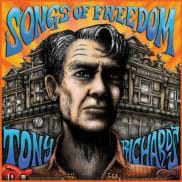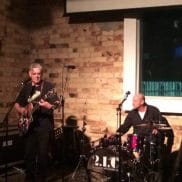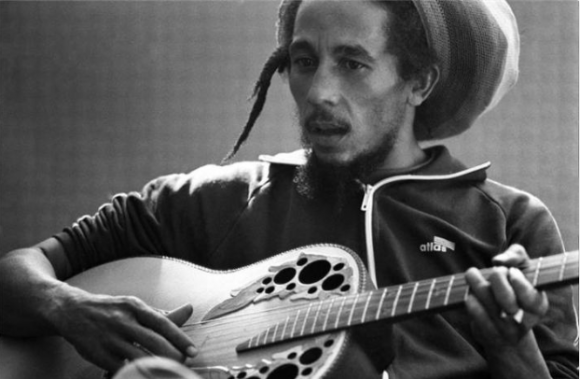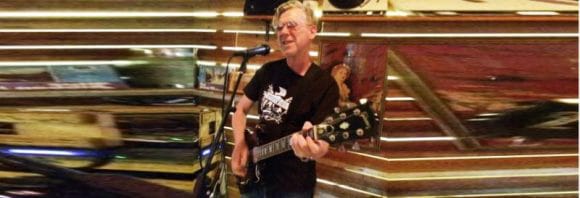
I have just released 3 new songs and a remix of a song from a previous album. Theo has created a Bandcamp site for me and loaded the recordings there. Centre Of The Groove, Hold Down Love and She Loves To Dance. All are acoustic guitar and voice recordings done in Studio Shed in one day. Joshua Lynn has thoroughly re-worked 1969 Is All You Need in his own studio. There are new vocals and it’s been slowed down from 169bpm to 126bpm while the pitch has remained the same. Clever man that Joshua Lynn who also added a kick drum which was never on the original and he’s done all sorts of other audio magic to it, so I’ve included it on this new release to make four songs. Thank you Will Saunders for the totally brilliant psychedelic album cover art.
Category: The Songs
The Kingslander show
The Kingslander is generally known as a sports bar and even though the management ‘tries music’ occasionally, priority will always be given to any significant sports event. But lately, they have taken a serious approach to the Thursday Open Mic night with the inclusion  of a massive PA system, a row of monitors and a two-person team, one to co-ordinate performers and the other to tech the sound. They still keep all the screens around the room live with Sky Sport on various channels, on mute, so the patrons can keep an eye on the latest Thursday night sporting events which happened to be Woman’s Boxing, Motorsport and Australian League.
of a massive PA system, a row of monitors and a two-person team, one to co-ordinate performers and the other to tech the sound. They still keep all the screens around the room live with Sky Sport on various channels, on mute, so the patrons can keep an eye on the latest Thursday night sporting events which happened to be Woman’s Boxing, Motorsport and Australian League.
There’s a very nice full drum kit on stage but Al was told, when taking to the stage, not to play too loud, as a result he played too soft and I could barely hear him. I played two songs using the looper which I realise now is not a good match with a live drummer because loops never loop perfectly and the groove can get a bit jumbled – but we rocked on. After two songs, Ramp It Up and Glow, Lydia, the host, asked us to wrap it up. I said we’d only played two songs and the slot is for three, admittedly both extended versions, and I insisted on finishing with a slow one, Centre Of The Groove, which I shortened down to a two minutes. It felt good to end on a more harmonic note but I came off stage feeling a bit rattled. I think the tech had put a heavy compressor on my guitar because it ducked in and out of volume. Al said, ‘I wish the sound on stage was like the practise room’. It’s true, it always sounds weird on stage and over the years I have never got totally used to it – I just rock on.
Portland Public House
Allan and I opened the evening at the Portland Public House last night and the place was humming.



I tried three different songs; a rocker called Ramp It Up . . ‘she looks so good playin’ guitarrr’, and then a funk groove, Glow . . ‘how da riddem makes u wana burn down slow’, and country style slow number, Waiting For The Stars To Align . . ‘no-one reads the manual, you figure it out yourself’. I looped a central section of each song and was glad Jono managed to get some bass out of the system working that sub at the Porty – oomph, oomph. It was so much better with Allan playing along on the bongos.
Choosing seven songs I wrote.
There are seven songs of mine that generally go well in just about any situation but the hardest part is choosing which one to start with. Do I open with something raw and rocking or something slow and expressive with jazz chords? I have a personal theory that an audience who has never seen or heard you before will decide within about 10 seconds if they like you. I spend a great deal of my practise time working on my openings. Choosing the right song is even more important. My friend Caitlin Smith says you should never second guess the audience’s taste – she says they just want ‘amazing’ – no pressure. I have a country pickin’ one, a funk groove, a light reggae, a slow blues-infused rocker, a bright swing number, a songbook style ballad and a rootsy boogie stomp. Seven hats. Currently, I’m opening with the blues-infused slow rocker called Hold Down Love with re-tuning of the b string down a tone to A.
Which seven cover songs?
Over the years I have learned to play many cover songs and standards, some more successfully than others and I am always amazed how some performers can remember hours of material – all those lyrics and chords! I find it easier to remember a few carefully chosen covers and just put my own spin on them. It takes a bit of work to turn a full band song into a solo number but if the melody itself is strong and well known it generally has a life of it’s own anyway. Sometimes I think playing covers is cheating a bit – it’s like standing on the shoulders of giants and getting a free ride. For this journey I wanted to concentrate on seven cover songs that would have wide appeal – songs I hoped people everywhere would know. Seven songs is about 30 minutes of performing time. It came down to selecting from some of my favourite artists: Jimi, Led Zep, Lennon/McCartney, Prince and of course, the one artist that seems to communicate more than all t he others, Bob Marley. The title of this blog, Songs Of Freedom, comes from Redemption Songs ‘. . and all I ever had, were these songs of freedom, redemption songs.’ Bob recorded it as a solo acoustic number on the Uprising album – not quite reggae, more a folk song really, but that opening riff is so recognisable – it had to be in.
he others, Bob Marley. The title of this blog, Songs Of Freedom, comes from Redemption Songs ‘. . and all I ever had, were these songs of freedom, redemption songs.’ Bob recorded it as a solo acoustic number on the Uprising album – not quite reggae, more a folk song really, but that opening riff is so recognisable – it had to be in.
There’s more to come on the cover songs I chose.
